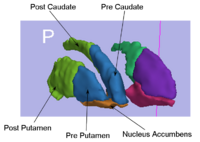Difference between revisions of "DBP1:Irvine"
| Line 8: | Line 8: | ||
{| | {| | ||
| − | | style="width:10%" | [[Image: | + | | style="width:10%" | [[Image:Striatum1.png|thumb|left|200px]] |
| style="width:90%" | | | style="width:90%" | | ||
| − | |||
| − | |||
| − | |||
| − | |||
| − | |||
| − | |||
| − | |||
| − | |||
| − | |||
| − | |||
| − | |||
== [[Projects:RuleBasedSegmentation|Rule Based Segmentation]] == | == [[Projects:RuleBasedSegmentation|Rule Based Segmentation]] == | ||
Revision as of 02:17, 26 November 2007
Home < DBP1:IrvineBack to NA-MIC DBP1
Contents
Overview of UC Irvine DBP 1
A brief overview of the UC Irvine's driving biological problem goes here. This should not be much longer than a paragraph. Remember that people visiting your site want to be able to understand very quickly what you're all about and then they want to jump into your site's projects. The projects below are organized into a two column table: the left column is for representative images and the right column is for project overviews. The number of rows corresponds to the number of projects at your site. Put the most interesting and relevant projects at the top of the table. You do not need to organize the table according to subject matter (i.e. do not group all segmentation projects together and all DWI projects together).
UC Irvine Projects
Rule Based SegmentationIn this work, we provide software to semi-automate the implementation of segmentation procedures based on expert neuroanatomist rules. We have implemented our code in Slicer 2. We currently provide modules for the semi-automatic segmentation of the DLPFC and the Striatum. More... New: Here we give something new and exciting about the project. The most recent publication on this project is very appropriate for this slot. | |
| File:Placeholder.png |
DTI ValidationTo carry out quantitative and qualitative validation of the DTI tractography tools. These will be applied to a limited set of specific tracts in single data sets and single tractography tools, and on several data sets using at least two tractography programs and by investigators in different laboratories. More... New: Here we give something new and exciting about the project. The most recent publication on this project is very appropriate for this slot. |
| File:Placeholder.png |
Optimal Imaging Phenotypes In Schizophrenics and ControlsIn a legacy dataset of 28 chronic schizophrenics, to determine fMRI activation during working memory in schizophrenia and apply novel tools to assess circuitry between regions through combining behavior and BOLD signal analyses. More... New: Here we give something new and exciting about the project. The most recent publication on this project is very appropriate for this slot. |
| File:Placeholder.png |
Attentional Circuits In Schizophrenia In fMRI And PETTo use structural equation modeling to compare attentional circuitry within the legacy set of 28 schizophrenic subjects who performed similar attentional tasks in both a PET and fMRI scan. More... New: Here we give something new and exciting about the project. The most recent publication on this project is very appropriate for this slot. |
File:Placeholder.PNG 200px |
MultiSite MorphometryTo compare morphometric/volumetric differences in a multi-site anatomical sample of schizophrenic subjects, in collaboration with the FBIRN consortium. Subject morphometric scans will be sent to UCSD's morphometric processing lab (Dale) for automated processing. A system for submitting morphometric scans to processing pipeline and retreiving/wrapping the results for inclusion into FBIRN HIDs will be developed. The project will also be used to drive the development of the workflow processing system being developed by Shawn Murphey's group. More... New: Here we give something new and exciting about the project. The most recent publication on this project is very appropriate for this slot. |
